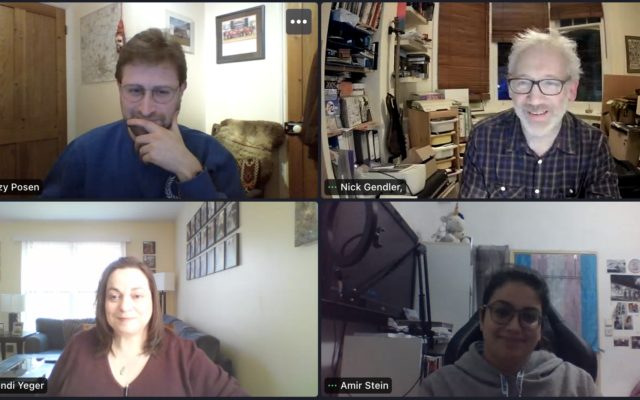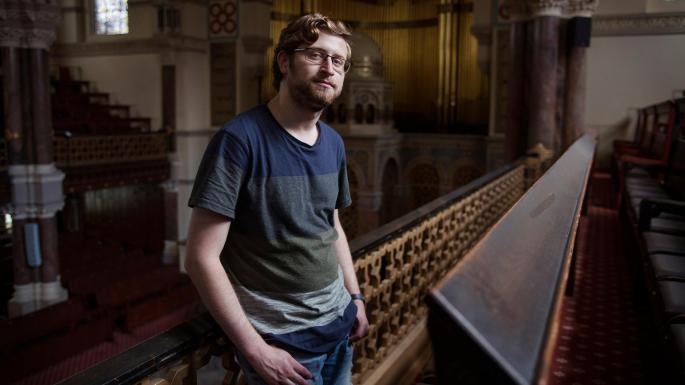Cultural chassid to modern Orthodox: Life after leaving the Charedi world
Jews who walked away from the communities they grew up in liken transitioning to secular life to arriving in a new country as immigrant
Three people who left their strictly Orthodox communities spoke at Limmud on Sunday about the importance of support organisations for those readjusting to new lives.
In a session, which was chaired by Nick Gendler of Mavar in the UK and watched by nearly 200 people, the trio described their personal stories and the sort of hurdles faced by those who take the difficult step of leaving their communities.
Mindi Yeger, a volunteer for the New York-based Footsteps organisation, grew up in Boro Park, Brooklyn, the child of Holocaust survivors. “My issues with religion and community started as I tried to divorce my husband.”
The way she was treated by both the rabbis and the community, she said, “opened my eyes; it’s close to 18 years since my journey out started. The biggest challenge was being able to finish raising my children in a more open-minded world”. Her three children are now adults and have children themselves.
Speaking from Israel, Amir Stein, originally from Bnei Brak, described his youth as “very happy” and “very religious”. But during a year studying in Gateshead, Stein, who now identifies as male, began “to ask questions which were not answered”, leading him to a decision not to remain religious. Hillel, the sister organisation to Mavar and Footsteps, had helped him so that he is now a university student, working on a mental health programme sponsored by the Israeli Ministry of Health.
Izzy Posen, who grew up in a strictly Orthodox community in Stamford Hill, graduated last summer from Bristol University and says: “I couldn’t have done this without Mavar. I lost my faith while I was at Gateshead Yeshiva and I didn’t know what to do. I didn’t know anyone in the secular world and there wasn’t really a place for me in the Chasidic community as an unbeliever. Mavar helped me with every aspect of my life along the way”.
Stein spoke of the “price that had to be paid” for yotzim – the term for those who leave – referring to the very real possibility of “excommunication and being disowned by one’s family and community. We start from Ground Zero basis”.
For Israeli yotzim, he said, “we were forced not to participate in stuff that is considered normal in Israeli society. In Israel, at age 18, you either go to national service or military service. When I was 16, my school made me sign a paper that I did not want to join the service. You don’t really understand the codes and the behaviour of Israeli society if you don’t go through that experience. It’s known in the Orthodox community that that’s why you shouldn’t join the service, because that’s the way you integrate into society”.
He added that many in the strictly Orthodox community did not get the same schooling as their secular contemporaries, including “basic maths and English and proper Hebrew”. With limited ability to sit a high school graduation exam, it was more difficult to access university and job opportunities.
Mindi Yeger said one of the constant issues for Footsteps is dealing with people who have been “married off, extremely young, in the Chasidic communities. You end up with 20-year-olds who realise they want something more in their lives, and what they have is a wife and three children. [This very often leads to] terrible custody fights and the humiliation of being vilified by their own families. It’s a very painful process”.
With no formal qualifications when he first left Orthodoxy — “as a yeshiva student I wasn’t supposed to have jobs or even handle money” — it was an uphill struggle for Posen to begin with. Like Stein and Yeger, he spoke of the hurdles to be overcome in catching up on education. Yeger compared yotzim to “new immigrants”, who come to Footsteps with little or no English, while Stein referred to people “who graduate from yeshiva with the knowledge of a four-year-old”. All three spoke of the difficulties in navigating cultural norms in the secular world with which they were not familiar.
But all the participants agreed that a number of factors — including the rise in film and TV representations of the strictly Orthodox world, and the pandemic — had led to a subtle shift in attitudes. It was “no longer inevitable” that custody of children would go to the religious partner, Yeger said, while being housebound by covid had obliged the strictly Orthodox to deal with the internet.
And for the yotzim themselves. it was no longer a case of “my Judaism being all or nothing”. Several people had found a modus vivendi where it was still possible to embrace aspects of Jewish life. Stein spoke of himself as “traditional” while Yeger said she had successfully integrated into a modern Orthodox community. And Posen described his present approach as “a cultural Chasid”, admiring several aspects of the Charedi life. With a smile, he declared: “I will wear a streimel at my wedding. Who will stop me?”

Thank you for helping to make Jewish News the leading source of news and opinion for the UK Jewish community. Today we're asking for your invaluable help to continue putting our community first in everything we do.
For as little as £5 a month you can help sustain the vital work we do in celebrating and standing up for Jewish life in Britain.
Jewish News holds our community together and keeps us connected. Like a synagogue, it’s where people turn to feel part of something bigger. It also proudly shows the rest of Britain the vibrancy and rich culture of modern Jewish life.
You can make a quick and easy one-off or monthly contribution of £5, £10, £20 or any other sum you’re comfortable with.
100% of your donation will help us continue celebrating our community, in all its dynamic diversity...
Engaging
Being a community platform means so much more than producing a newspaper and website. One of our proudest roles is media partnering with our invaluable charities to amplify the outstanding work they do to help us all.
Celebrating
There’s no shortage of oys in the world but Jewish News takes every opportunity to celebrate the joys too, through projects like Night of Heroes, 40 Under 40 and other compelling countdowns that make the community kvell with pride.
Pioneering
In the first collaboration between media outlets from different faiths, Jewish News worked with British Muslim TV and Church Times to produce a list of young activists leading the way on interfaith understanding.
Campaigning
Royal Mail issued a stamp honouring Holocaust hero Sir Nicholas Winton after a Jewish News campaign attracted more than 100,000 backers. Jewish Newsalso produces special editions of the paper highlighting pressing issues including mental health and Holocaust remembrance.
Easy access
In an age when news is readily accessible, Jewish News provides high-quality content free online and offline, removing any financial barriers to connecting people.
Voice of our community to wider society
The Jewish News team regularly appears on TV, radio and on the pages of the national press to comment on stories about the Jewish community. Easy access to the paper on the streets of London also means Jewish News provides an invaluable window into the community for the country at large.
We hope you agree all this is worth preserving.























